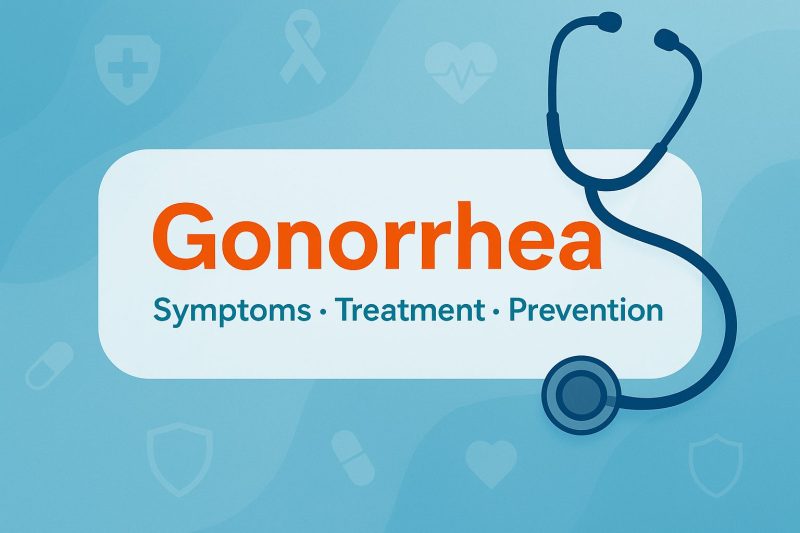

Gonorrhea: causes, symptoms, prevention, and treatment
Gonorrhea: Causes, Symptoms, Prevention, and Treatment
Gonorrhea is one of the most common and serious sexually transmitted infections (STIs) worldwide, with origins tracing back thousands of years and continuing to pose a major public health challenge in the modern age. Known for its ability to infect both men and women and potentially cause long-term complications if untreated, gonorrhea is a bacterial infection that demands attention, awareness, and proper education.
What is Gonorrhea?
Gonorrhea is a sexually transmitted infection caused by the bacterium Neisseria gonorrhoeae. It infects warm, moist areas of the body, such as the reproductive tract, urethra, rectum, throat, and even the eyes. People become infected through unprotected sexual contact—vaginal, anal, or oral—with an infected partner. It can also be passed from a mother to her baby during childbirth, resulting in serious health issues for the newborn.
The Origin of Gonorrhea
Gonorrhea has been around for centuries. References to gonorrhea-like symptoms appear in ancient Egyptian and Greek writings. The term “the clap,” a popular nickname for the disease, may have come from the French word “clapier” (meaning brothel) or from a crude old method of slapping the penis to clear discharge. Regardless of its name, gonorrhea has consistently been a major concern throughout human history, especially with the emergence of drug-resistant strains in recent decades.
How Gonorrhea is Transmitted
Gonorrhea spreads primarily through sexual contact, including:
-
Vaginal sex
-
Anal sex
-
Oral sex
You can also contract gonorrhea by touching infected fluids and then touching your eyes, or during childbirth if a mother is infected. The bacteria thrive in mucous membranes and can spread quickly without any visible symptoms in some people.
Symptoms of Gonorrhea
Symptoms of gonorrhea vary by gender and the site of infection. Many people—especially women—may have no symptoms at all, which makes early detection through testing critical.
In Men:
-
Painful or burning sensation when urinating
-
White, yellow, or green discharge from the penis
-
Swollen or painful testicles
-
Increased need to urinate
In Women:
-
Unusual vaginal discharge
-
Pain or burning while urinating
-
Bleeding between periods
-
Pelvic or lower abdominal pain
-
Pain during sexual intercourse
In Both Genders (Oral or Rectal Infections):
-
Sore throat
-
Rectal pain, discharge, or bleeding
-
Itching or soreness in the anus
Complications if Left Untreated
If gonorrhea is not treated promptly, it can lead to serious health problems, including:
-
Pelvic Inflammatory Disease (PID) in women, which can cause infertility or ectopic pregnancy.
-
Epididymitis in men, which may also result in infertility.
-
Disseminated Gonococcal Infection (DGI), where the infection spreads to joints, skin, or blood, potentially becoming life-threatening.
-
Increased risk of HIV transmission.
How to Prevent Gonorrhea
Preventing gonorrhea requires informed sexual health practices. Here are some effective prevention tips:
-
Use condoms consistently and correctly during all forms of sexual activity.
-
Get tested regularly if you’re sexually active, especially if you have multiple partners.
-
Limit your number of sexual partners.
-
Avoid sexual contact with anyone showing signs of an STI.
-
Communicate with your partner about STI testing and protection.
-
Pregnant women should get tested early to protect their babies from infection during childbirth.
Diagnosis and Testing
Since gonorrhea often shows no symptoms, regular STI screenings are essential. Testing typically involves:
-
A urine test
-
A swab from the genitals, rectum, or throat
-
Testing is fast, confidential, and widely available at hospitals, clinics, and sexual health centers
Treatment and Cure
Gonorrhea can be cured with antibiotics, but rising drug resistance is making treatment more difficult. The current standard treatment recommended by the CDC is:
-
An injection of ceftriaxone
-
Oral doxycycline (especially if there’s co-infection with Chlamydia trachomatis)
It’s crucial to complete the full course of antibiotics, even if symptoms disappear. Also, avoid any sexual activity for at least 7 days after treatment, and ensure your partner(s) are also treated to avoid reinfection.
The Threat of Antibiotic Resistance
In recent years, Neisseria gonorrhoeae has developed resistance to many older antibiotics. This is a global health concern, as some strains no longer respond to traditional medications. This emphasizes the importance of:
-
Judicious use of antibiotics
-
Ongoing medical research
-
Strong public health education on STI prevention
Final Thoughts
Gonorrhea remains a dangerous but preventable sexually transmitted infection. Its long history, silent nature, and increasing resistance to treatment highlight the need for public education, early testing, and safe sex practices. Whether you’re sexually active or in a committed relationship, staying informed and taking proactive steps can protect your health and prevent the spread of this infection. Don’t wait for symptoms—get tested, get treated, and protect your future.
